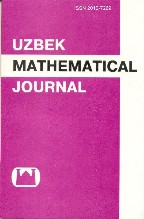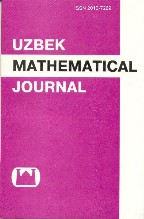Uzbek Mathematical Journal (UzMJ) follows clear ethical standards for publication to ensure high quality scientific work and to enhance public trust in their findings.
All submitted manuscripts must be original and not in a process of consideration elsewhere (for example in other journals or conference proceedings).
1. Editorial Standards and Processes
- Authorship: Published work must be attributed to one or more authors who are complied with authorship standards.
- Fund and Support: Authors are requested to disclose any received fund or support from individual or organization in the “Acknowledgment” section.
2. Peer-review Process
To ensure robust, objective, confidential, transparent and free of conflicts of interest peer-review process, UzMJ adopts the international policies of peer-review process (i.e. single-blind or double-blind, reviewers selection, conflict of interest, response time).
- Reviewers Selection: Authors may provide the list of the potential reviewers in their cover letter. UzMJ has the right to adopt the same list of provided reviewers or switch to another.
- Peer-review Conflict of Interest: Any conflict of interest should be reported directly to the editors as soon as receiving the invitation to review manuscripts.
- Confidentiality during Manuscript Handling: To ensure utmost confidentiality; UzMJ’s editors don’t share Manuscripts with any third party except the peer reviewers.
3. Publication Ethics:
- Misconduct: UzMJ's editors make every effort to identify, detect and prevent any practices of data fabrication, authorship abuse, falsification, image manipulation, unethical research, plagiarism, biased reporting, duplicate publication, and undeclared conflicts of interest.
- Fabrication, Falsification and Image Manipulation: UzMJ makes every effort to identify, detect and prevent data fabrication, falsification.
- Plagiarism: UzMJ’s editors make every effort to ensure that manuscripts are original material and prevent any practices of plagiarism and duplicate of publication. If such practices detected, authors are informed to handle them. If authors will not act, editorial board can retract them by their decision.
- Duplicate Submission: To make sure that all manuscripts are not being published elsewhere, UzMJ makes every effort to identify, detect and prevent concurrent or duplicate submission. If such practices detected, UzMJ applies strict actions and sanctions against these authors i.e papers are withdrawn from the website.
- Sanctions: If any violations of the publication ethics or professional codes are detected, then strict action is taken, according to UzMJ's procedures for dealing with unethical behavior as follows:
▪ A warning letter to the author covering the misconduct.
▪ Immediate rejection of the submitted manuscript.
▪ Probation period is applied to all responsible authors regarding any further submission to UzMJ.
▪ Probation period is applied to all responsible authors regarding serving as referees/reviewers for UzMJ.
▪ Publication of a formal notice detailing the misconduct.
▪ A professional letter to the chairman of the authors or reviewers department or funding agency.
▪ Formal retraction or withdrawal of a publication from the journal.
▪ Reporting the case and outcome to a professional organization or higher authority for further investigation and action.
▪ Further sanctions may be imposed, if violations of the above policies are found to be serious.
- Editors and Board Members as Authors: NSP’s journals adopt well defined procedures and police to exclude editors from publication decisions when they are authors.
- Conflicts of Interest: To ensure objectivity in the review procedure, editors and peer reviewers are requested to disclose that there is no any conflict of interest.
- Appeals: To appeal against editorial decisions, authors refer to the international based mechanism that is adopted by UzMJ.
- Corrections: UzMJ welcomes authors or readers to notify the journal editorial office if any errors discovered in the published work. If such occurred, editors and authors are notified to correct theses errors, then an erratum will be published in an issue in the same journal.
4. Research Ethics in Journal Articles
- Human Rights, Privacy and Confidentiality: Outcomes of clinical trials studies must be officially registered with public health authority in the country. Otherwise, authors are requested to a letter of explanation.
- Reporting Guidelines: UzMJ’s editors and peer reviewers make every effort to ensure that the necessary information is available in the submitted manuscripts for the purpose of evaluation by readers.
5. Copyright and Access
- Copyright and Licensing Information: Copyright and licensing are clearly described in the guidelines for authors. By submitting a manuscript for publication to the journal, authors acknowledge that the work is original and is not being submitted to another journal. The submission of a manuscript by the authors implies that the authors automatically agree to assign exclusive copyright to UzMJ if and when the manuscript is accepted for publication.
- Archiving: UzMJ is a member of CrossRef which gives UzMJ the ability to create and deposit digital object identifiers (DOIs) for the content we produce. We allocate DOIs to our publications by depositing bibliographic metadata for each article with CrossRef while citing metadata that includes the current location of the journal on the website.

